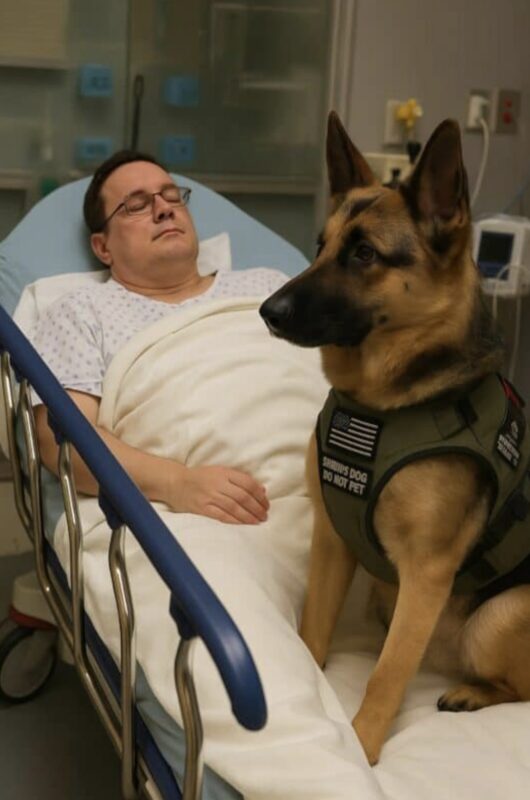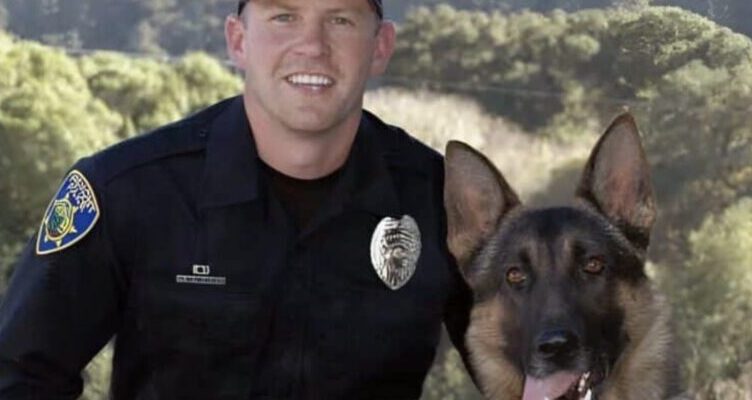The stillness in the hospital room was so dense it felt as if even the air itself had frozen. On the walls, the pale flicker of neon lights cast muted shadows across the bed where Alex lay. He was a police officer.
Not just any officer — a hero who rescued people from blazing buildings, chased down armed criminals, and never backed down when others were in peril.
But now it was he who lay there, motionless, surrounded by tubes and machines, teetering on the edge between life and death.
His chest rose and fell barely perceptibly with each breath. The soft beeping of the monitors signaled: he was still alive. Yet every sound grew weaker, more hopeless.
The doctors fought hard, sweat dripping from their brows, exchanging commands, switching medications, but time was ruthless. At one point, the chief physician whispered almost inaudibly:
— It’s over…
The screen showed a flat line. Alex’s heart had stopped.
On the other side of the door, in the sterile hospital corridor, a dog waited. A German Shepherd. Alex’s loyal partner, his service dog with whom he had spent years working side by side. His name was Rex.
People no longer said “Alex and his dog,” but simply: “Alex and Rex.” They were inseparable.
If Alex was on duty, Rex was right there. When there was a chase, Rex ran alongside. When a rescue was needed, Rex was the first to leap into the rubble.
Now Rex sat motionless by the door. He didn’t howl.
He didn’t scratch at the door. He just stared ahead, as if he understood that the greatest battle was raging inside. Not a physical fight, but an invisible struggle between life and death.
A young nurse, struggling to hold back tears, whispered:
— Let him say goodbye…
The decision was made. The dog was allowed inside.
Rex stepped slowly into the room. Not hurried, not restless, but as if mourning. As if he knew exactly where he was going and why.
He stopped beside the bed, looked up at Alex’s face… then let out a soft whimper.
In his eyes was a sorrow that words could hardly capture. He lowered his head and gently nestled against the bed.
Then something happened.
Rex suddenly froze. His ears perked up. The next moment, he let out a sharp, almost desperate bark. One, then another. The sound filled the room.

Suddenly he jumped onto the bed. Resting his front paws on Alex’s chest, he began nudging, poking with his head, pulling at his clothes, as if to say:
“Get up! It’s not over yet!”
The staff stared in disbelief.
— What’s wrong with him? — asked one nurse.
— Get the dog away! — shouted another.
But a doctor stepped forward and raised a hand.
— Wait… look… his hand…
And indeed. Alex’s hand moved. Barely noticeable. A finger twitched. So faint at first that only those paying close attention noticed. Then again.
— Bring the monitor back! Quickly! — the doctor ordered.
The EKG restarted, and what had been a flat line once again pulsed. Weak, slow, but real. Alex’s heart beat again.
In the following minutes, the room filled with motion. Doctors rushed, revival efforts began, oxygen was administered, medicines given. Adrenaline. A new chance. And Rex stayed there, on the bed, on Alex’s chest.
He didn’t move. Didn’t bark. He just watched. And from his gaze emanated something deep and ancient: “I knew you wouldn’t leave. You still have work to do.”
Alex survived. Not just because of the doctors — though they were heroes too. Not because of the machines or the drugs. But because of something else. A feeling beyond science.
A bond that cannot be broken. A faithful companion who believed in him when everyone else had given up.
That night, in the hospital corridor, people wept quietly. Doctors, nurses, patients.
Not from shame or fear, but because they had witnessed a miracle. The power of a dog’s heart. The strength of a connection.
And Alex? Later he said only:
— I don’t know what happened… I only remember someone calling me back. I think it was Rex.
